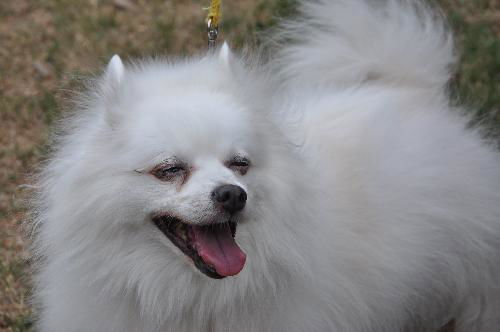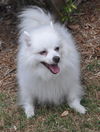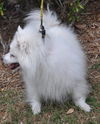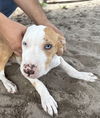
| My Rescue |
| Login to Remember your Favorite Animals and Breeds! |
Won't you consider helping her get a new start?
Bingo is looking for a home because her senior owner could no longer afford basic care. She has had a good life and seems to have some years left in her. This is what her owner had to say to her:
She is 11 yrs old and has been in our family since a puppy, when I bought her for my Granddaugter (then a 3 yr old toddler). She is spayed and had a check up about 1 yr ago with no health issues. She is very sweet, calm, well behaved, has been raised with cats and other dogs and gets along well with children. Loves attention, but not hyper. Now that she is older she can't take long walks, doesn't play fetch. She just loves to be with you, lays by my feet and by the bed at night. She never jumps up on the bed or furniture. She will bark to alert you to other people outside her territory, but not a barker for no reason. She is most definitely housebroken, as she stays in the apartment all day while I am at work and never has an accident. She would love a home with a older couple or single person to be your companion, but also loves kids.
According to www.dogbreedinfo.com, the American Eskimo is one of the Spitz families of Nordic breeds. They are closely related to the white German Spitz. German Spitz were eventually brought to America, where the name changed to American Eskimo Dog, due to the widespread anti-German feelings during World War I. Today they are known as a separate breed, but are closely related to the German Spitz. Samoyed and White Keeshond are also possibly related to the America Eskimo Dog. Evidence suggests that "White Spitz" dogs were first brought to the United States by German settlers. A couple named Hall, in 1913, were the first to register the breed with the UKC. Their kennel name was "American Eskimo" which became the name of the breed. The American Eskimo was spread throughout the United States by the Barnum and Bailey Circus. Stout's Pal Pierre was the first dog ever to walk a tight rope. The American Eskimo is a charming, affectionate and loving dog. Hardy and playful, they are excellent with children. Highly intelligent and willing to please. Alert and easy to train, the American Eskimo often ranks among the top scorers in obedience trials. Some individuals have a willful streak, but most like to work. Dogs whose ancestry displays nervousness, hyperactivity or viciousness should not be bred. They are naturally wary of strangers, but once introduced, they become instant friends. Some have been known to not let a stranger enter the home until the owner says it is okay. Eskimos need to be part of the family and engage in nuisance activities when isolated. Handle them gently, but firmly. This breed needs attention and loves to bark. Eskies should be thoroughly socialized when young to avoid potential aggression-related accidents. They have a life-expectancy of 15 years or more.
Other Pictures of Bingo the American Eskimo (click to see larger version):
 59.6k |
 65.1k |
 46.4k |
 24.4k |
 45.7k |
 32.8k |
 31.7k |
 43k |
Copyright © Pet Rescue by Judy





